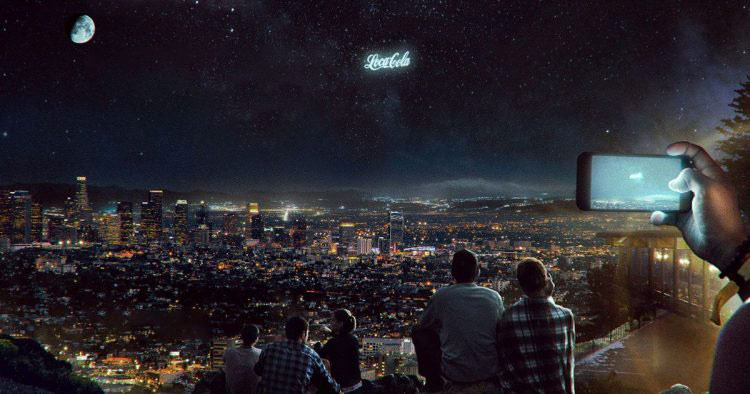夜空中发光的不一定是星星:俄罗斯企业计划将广告打到天上去 Russian startup plans to launch giant ad billboards in low-earth orbit
中国日报网 2019-01-25 08:49

一闪一闪亮晶晶,满天都是广告牌。未来世界的夜空恐怕会是这个样子。
近日,俄罗斯一家公司宣布将把广告做到天上去,让全世界的人们仰望夜空时都能看见。月朗星稀的好风景,可能将会成为历史。

Imagine looking up to gaze at the moon on a clear summer night only to see the sky full of glowing advertising billboards. That’s the future envisioned by a Russian start-up which plans to launch billboard advertisements into low-Earth orbit as early as 2021.
想象一下,在一个晴朗的夏日夜晚仰望明月,却看见满天都是闪闪发光的广告牌。这就是俄罗斯一家初创企业设想的未来。该公司计划最早于2021年将广告牌发射到近地轨道上。
Russian company StartRocket announced plans to introduce orbital advertising billboards made up of a grid of tissue box-sized satellites called CubeSats. These tiny satellites will orbit 400-500 kilometers above the Earth and use reflective Mylar sails around 30 feet in diameter to catch and reflect sunlight, creating a pixelated matrix. The ads would only be visible at night but could be seen from just about anywhere on the planet. The company already has a CubeSat prototype, and could start testing its sky advertisements next year.
俄罗斯公司StartRocket宣布,计划推出用纸巾盒大小的卫星CubeSat排列成的入轨广告牌。这些微型卫星将在地球上方400至500千米的高空运行,并用直径约30英尺(9米)的反射性聚酯薄膜帆布捕捉和反射太阳光,从而构建出像素矩阵。这些广告牌只有夜晚可见,但是在地球上几乎任何地方都能看得到。该公司已经有CubeSat的原型,明年就可能开始测试“天空广告”。
Mylar['maɪ'lɑr]: n. 聚酯薄膜
"We are ruled by brands and events,” StartRocket project leader Vlad Sitnikov told Futurism. “The Super Bowl, Coca Cola, Brexit, the Olympics, Mercedes, FIFA, Supreme and the Mexican wall. The economy is the blood system of society. Entertainment and advertising are at its heart. We will live in space, and humankind will start delivering its culture to space. The more professional and experienced pioneers will make it better for everyone.”
StartRocket公司的项目负责人弗拉德·西特尼科夫告诉Futurism网站说:“我们的生活被各种品牌和大事所主导着。超级碗、可口可乐、英国脱欧、奥运会、梅赛德斯、国际足联、潮牌Supreme、墨西哥边境墙。经济是社会的血液系统。娱乐和广告是经济的中心。未来我们将生活在太空中,人类会开始将文化传送到太空。作为先驱者,我们越专业,越有经验,对大家越有好处。”
However, not everyone agrees that having enormous billboard-style advertisements in the night sky will be good for everyone. Experts have argued that the bright ad banners could interfere with the ability to study the skies, or that the grid of satellites will eventually become space junk and potentially interfere with more significant space activity or aviation safety.
然而,不是所有人都赞成,在夜空中放多个巨大的广告牌对大家都有利。专家指出,耀眼的广告牌会阻碍人类研究天空,而且这种卫星网最终会成为太空垃圾,可能会对更重要的太空活动或飞行安全造成干扰。
"Putting more satellites up there is going to cause more opportunities for collisions, and we don’t want that happening,” John Crassidis, a professor of mechanical and aerospace engineering at the University at Buffalo, told NBC News. “My biggest issue is that these objects are going to become space junk. It’s not serving any good purpose outside of advertising, I’m not a big fan of this at all.”
布法罗大学航天机械工程学教授约翰·克拉西迪斯告诉美国全国广播公司新闻网说:“将更多的卫星发射到空中会增加碰撞的机会,这是我们不想看到的。我最大的担忧是这些物体会成为太空垃圾。除了广告以外,这些物体毫无用处,总之我不看好这个项目。”
Astronomer John Barentine told Astronomy.com: "It’s a threat to the ability to do astronomical research from the ground, every one of those moving blips of light in the night sky is something that can interfere with our ability to collect photons from astronomical sources.”
天文学家约翰·巴伦廷告诉天文学网站说:“这会对地面上的天文研究能力造成威胁。夜空中每一个运动的光点都会影响我们收集来自天文活动的光子的能力。”
blip[blɪp]: n. (在雷达屏幕显示出的)物体光点
photon['fotɑn]: n. [物] 光子;辐射量子

Sitnikov doesn’t seem to be bothered about the criticism his company’s project has received from the scientific community, though. He claims space advertising is inevitable, and compared the reactions “Orbital Display” has been getting to people’s reactions to TV ads at the advent of television.
不过西特尼科夫似乎并不在意科学团体对公司项目的批评声。他表示,太空广告是不可避免的,并将“轨道展示”所引起的反应和电视机刚出现时人们对电视广告的反应相提并论。
"If you ask about advertising and entertainment in general — haters gonna hate,” Skorupsky said. “We are developing a new medium. At the advent of television no one loved ads at all. What if we will invent a new media, the first media in orbit?”
“如果你问人们对广告和娱乐的看法,总会有人看不惯。”西特尼科夫说:“我们正在研发的是一种新媒介。在电视机刚出现时,不是也没人喜欢广告么?说不定我们就此发明了一种新媒体——首个轨道媒体呢?”
Although, technically feasible, the Orbital Display project is likely to face some regulatory hurdles. Still, I wouldn’t be surprised if instead of stars, we’ll be looking at ads from the world’s biggest brands when looking at the night sky in the not so distant future.
不过,就算在技术上可以实现,轨道展示项目也会面临一些制度上的障碍。尽管如此,在不久的将来,如果我们仰望夜空,看到是国际大品牌的广告而不是星星,我也不会感到惊讶。
英文来源:Oddity Central
翻译&编辑:丹妮

















 英语点津微信
英语点津微信 双语小程序
双语小程序